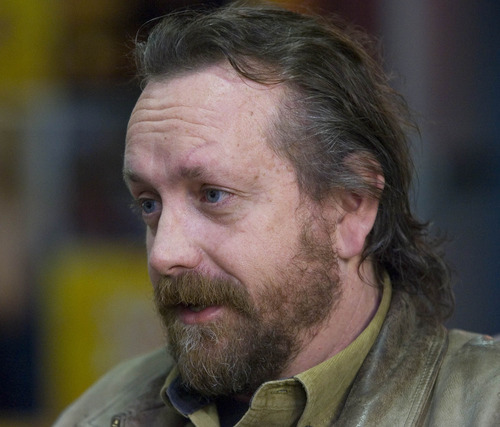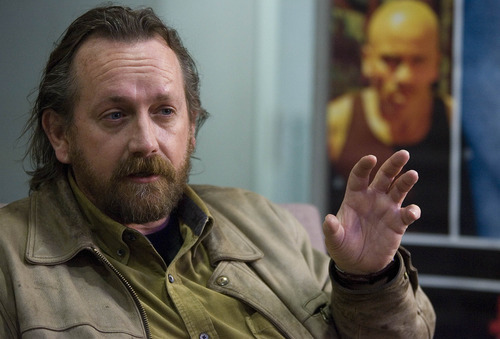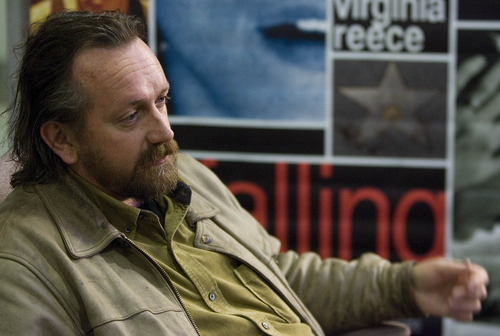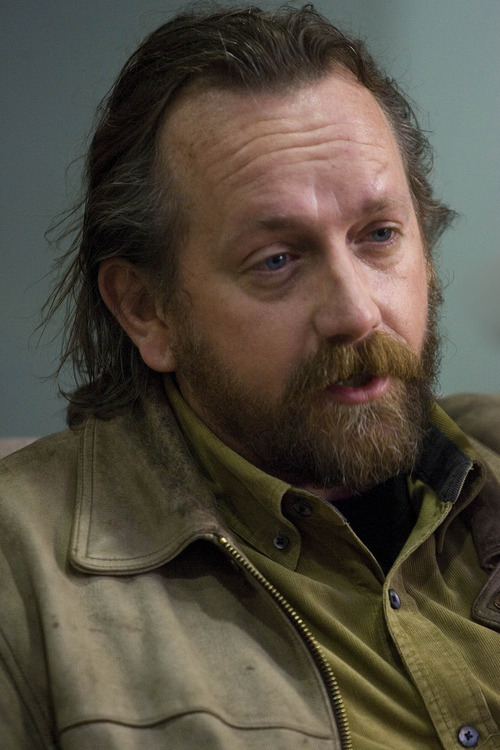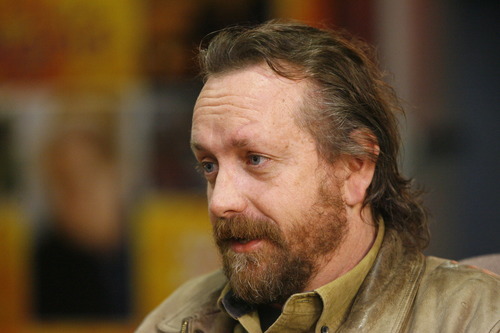This is an archived article that was published on sltrib.com in 2012, and information in the article may be outdated. It is provided only for personal research purposes and may not be reprinted.
When Richard Dutcher wrote the screenplay for his dark drama "Falling" in 1999, he hadn't started shooting his landmark LDS missionary film "God's Army," and he was a devoted member of The Church of Jesus Christ of Latter-day Saints.
When Dutcher finally filmed the movie in 2007 — around the same time he was filming "States of Grace," the quasi-sequel to "God's Army" — he wasn't a Mormon anymore.
"In a very real sense, the writer was a very different person than the director was," Dutcher, 47, said in an interview this week. "The director was no longer a believer, but the script writer had been."
Now, four years after its brief theatrical debut, Dutcher is bringing "Falling" back to theater audiences. It will begin a run on Friday, April 27, at the Broadway Center Cinemas, 111 E. 300 South, Salt Lake City.
Dutcher isn't the only LDS artist who has found his Mormon faith at odds with his artistic expression, but the story of how he went from devotion to doubt is more jarring than most.
"I've talked to a lot of people, in Mormonism and outside of Mormonism and other religions, who have had this kind of cataclysmic experience, and usually it's a very gradual thing where people begin to question, and they have an erosion of faith over time," Dutcher said. "For me, it was kind of instantaneous."
—
Exploring faith • It's not a given that artists who are Mormon, and explore questions about their faith in their art, are more apt to leave the church than to stay. "The perception that LDS fine artists who explore their beliefs abandon them is no more true than a similar statement might be about LDS historians, carpenters and salesmen," said Glen Nelson, director of the Mormon Artists Group, in an email.
Nelson keeps a database of more than a thousand LDS artists, and they defy easy stereotyping. "They live all over the world," he said. "They're serious, well-trained and, to varying degrees, ambitious."
There are many LDS authors out there, according to Margaret Young, who teaches creative writing at Brigham Young University and is president of the Association of Mormon Letters. The problem with many of them, she said, is that "they tend not to be very good. They don't explore depth of conflict, and have easy resolutions."
Mormon artists who leave the faith are more likely to get noticed, said playwright James Goldberg, whose play "Prodigal Son" won the AML's award for drama in 2008.
"Mormon artists who talk about Mormonism from a position of faith have a harder time finding a national audience for their works than Mormon writers who deal with ambivalence or portray the faith more critically," Goldberg said in an email. "If a national audience expects people to be conflicted about or opposed to Mormonism, of course those works would have an easier time nationally than works that explore faith commitment."
That may be changing, particularly in the science-fiction and fantasy genres. Young cited Orson Scott Card, the mega-successful author of Ender's Game, who includes LDS themes in his works. Young and Goldberg noted the work of Eric James Stone, a Utah County author who last year won a Nebula Award for his science-fiction short story "That Leviathan, Whom Thou Hast Made."
—
Following the path of filmmaking • For a time, Dutcher was an example of a Mormon artist who successfully balanced faith and art.
"I had always taken film as a way to explore my own spirituality," Dutcher said. "I wasn't trying to share with the world answers that I had. For me, it was like some question that fascinated me, or some challenge that I saw in living a life of faith."
Dutcher was the first and fiercest proponent of a wave of LDS-themed moviemaking launched in 2000 with the release of "God's Army." He wrote, directed and starred in the film, portraying a driven LDS missionary in Los Angeles.
"God's Army" was an independent hit, taking in an estimated $2.6 million at the box office (according to the Internet Movie Database) and ushering in a wave of Mormon movies. Dutcher even made a cameo in one of those movies, the comedy "The Singles Ward." (He later asked the filmmakers to edit his appearance out of the DVD release.)
His follow-up movie, "Brigham City" (2001), was a murder mystery/morality drama in which Dutcher played a sheriff who was also the town's LDS bishop. It had a bigger budget than "God's Army," and even a name actor in Wilford Brimley. But it wasn't as successful as "God's Army," earning just over $850,000.
Dutcher pressed ahead, though, with plans to write and direct what he envisioned would be a Mormon epic: "The Prophet," a biography of LDS Church founder Joseph Smith.
That's when his life changed.
"The filmmaking process, up to that point, had kind of informed my spiritual life, and my spiritual life had informed my filmmaking," he said. "Then what I found was the filmmaking itself led me to an entirely new and unexpected place."
In researching the life of Smith for his film, Dutcher said, "one day, I just simply asked myself the question, 'What if it simply isn't true?' " In a faith where adherents often begin their testimony with "I know this church is true," that question carries enormous weight.
"My own brain, something from the deepest part of me, said, 'Of course it isn't true.' After that, the whole house of cards fell," Dutcher said. "In a very real sense, in the time span of one minute, I went from being a true believer to being a complete nonbeliever. It was actually quite terrifying."
Dutcher's "faith crisis," as he often calls it, caused "a complete upheaval of my entire life, my personal life, my professional life." It confused his audience and drove away potential financial backers — and was a contributing factor, though he says not the only one, in his divorce last year from his wife of 23 years, Gwen.
Just after leaving Mormonism, Dutcher plowed into working on his films, shooting two low-budget movies practically back-to-back: "States of Grace" (2005), a missionary drama that was a good deal darker and more morally ambiguous than "God's Army," and "Falling."
—
"The first R-rated Mormon film" • In "Falling," Dutcher plays Eric Boyle, a Los Angeles videographer who used to have dreams of being a great filmmaker. He also used to be an LDS missionary (momentary shots of Dutcher in "God's Army" are seen in flashback). Now, he shoots video of crime scenes and bloody accidents, selling them freelance to local TV stations — and faces an ethical challenge when he captures a murder on tape.
Meanwhile, his wife, Davey (Virginia Reece), a struggling actress, faces her own moral dilemma involving the infamous "casting couch." "There's something about this whole experience that the character goes through that seems very metaphorical for my own path, my own journey," Dutcher said.
"Falling" received a brief theatrical release in 2008, in Los Angeles and in Salt Lake City (where Dutcher puckishly paid for a billboard on I-15 touting "the first R-rated Mormon film").
"I had the first public screening of it, and watching the film with the audience, it just felt kind of complete to me," Dutcher said. "It didn't really matter for me if the film was successful. … I felt just like putting it away."
So he put it away and finished editing "Evil Angel" (2009), a horror movie co-starring Ving Rhames, Dutcher said he did mostly "to have some fun and create some scares."
Dutcher was encouraged to put "Falling" back in theaters by the Salt Lake Film Society and by his girlfriend, Audrey Rock, a former movie critic for the Tooele Transcript-Bulletin.
"[Audrey] saw the film and said, 'You've got to get this out there,' " he said. "Now, maybe, enough time has passed that I can go, 'Yeah, OK, it's time to put it out, to let people see this movie.' "
Dutcher said his expectations for "Falling's" success are tempered. He'd like to see it find a small art-house audience, enough to get a DVD release and some TV distribution.
More movies are in the works, including a comedy he's written, "The Boys at the Bar," that he aims to shoot soon.
He still aims to explore his spirituality through his filmmaking, even though he's not in any one religion.
"I have a very hard time imagining myself a part of any organized church," he said. "I still believe in God, although I don't presume to know who he, it or she is. … I have more of a humility about my spirituality. Even though I have things that I believe, I don't believe in them firmly enough that I'll go out there and try to convince other people of my own ideas."
'Falling' returns
Richard Dutcher's 2008 drama "Falling" returns to theaters for a run starting Friday, April 27, at the Broadway Centre Cinemas, 111 E. 300 South, Salt Lake City.
Dutcher, the film's writer, director and star, will be in attendance for a post-screening Q-and-A after the 7 p.m. screening Friday, April 27. Admission to that screening is $10.


